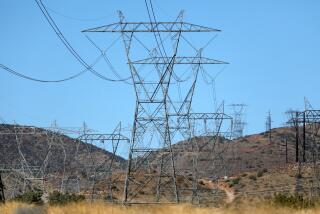Connecting
- Share via
Telephone companies keep promising to send easy-to-understand monthly bills--that is, statements that clearly outline usage, prices and rate hikes, as well as explain all those crazy fees and surcharges.
Clearly, the day has not yet come. AT&T;, Sprint and others seem bent on fattening phone bills by raising existing fees and adding strange new surcharges.
Sprint, for example, this month added a “state cost recovery charge” to long-distance customer bills in California and eight other states. The new monthly fee ranges from 57 cents in Michigan to $1.99 in Arkansas. Sprint’s California customers now pay an extra $1.60 a month. Soon, the fee will be extended nationwide.
Why? Sprint’s Web site says the charge is “based on the access costs that Sprint pays to the local phone company to utilize local phone lines.”
But consumer groups are skeptical. None of Sprint’s competitors list a similar fee. And the Federal Communications Commission has no listing for a “state cost recovery charge” and hasn’t mandated any such fee.
What’s more, Sprint’s new surcharge sounds very much like the recently eliminated Presubscribed Interexchange Carrier Charge, or PICC, which was used to reimburse long-distance carriers for just the sort of access fees now cited by Sprint.
Last year, the FCC slashed the access charges long-distance companies pay to local phone companies--saving Sprint and other carriers an estimated $3.2 billion a year. Long-distance companies were supposed to pass that savings on to their customers by eliminating the PICC fee for residential customers as of last July 1.
So what gives? The company said the new fee covers in-state long-distance access charges it pays to Pacific Bell and other local phone companies--not the state-to-state access fees that the FCC just reduced.
Most long-distance companies simply account for the differing access fees by charging different prices in each state. Sprint says its new fee enables it to set a single per-minute rate for all in-state calls, regardless of where the customer lives.
That may be, but Sprint’s current plans don’t reflect that logic. Under the company’s popular Nickel Nights plan, customers in Arkansas, California and Colorado pay $8.95 per month, plus a new monthly “state recovery” charge of $1.99, $1.60 and $1.30, respectively.
Customers in all three states pay 5 cents per minute for state-to-state calls. In-state calls, however, continue to vary by state, with Sprint’s Arkansas, California and Colorado customers paying per-minute toll charges of 10 cents, 5 cents and 12 cents, respectively.
Bottom line: Even if fully justified, Sprint’s new fee amounts to another phone bill charge that confuses customers.
What’s more, Sprint and AT&T; also recently hiked another phone line item: the Universal Service Fund, or USF, charge. The charge is the phone companies’ way of recouping the money they pay into the Universal Service Fund, the subsidy program that assures telephone service availability for low-income and underserved communities.
The FCC recently raised phone company contributions to 6.7% of total revenue from international and interstate customer calling, up from 5.7%.
In response, Sprint raised its USF charge even more, hiking it to 9.6% of monthly calling charges, up from 6.8%. On Jan. 1, AT&T; upped its USF charge to 9.9%, up from 8.6%. WorldCom’s MCI unit, the nation’s second-largest carrier, currently charges 8.3%.
People who make few long-distance calls may not feel the hit, but the moves by Sprint and AT&T; will add several dollars to the monthly bills of heavier users.
*
Times staff writer Elizabeth Douglass covers telecommunications.
More to Read
Inside the business of entertainment
The Wide Shot brings you news, analysis and insights on everything from streaming wars to production — and what it all means for the future.
You may occasionally receive promotional content from the Los Angeles Times.










